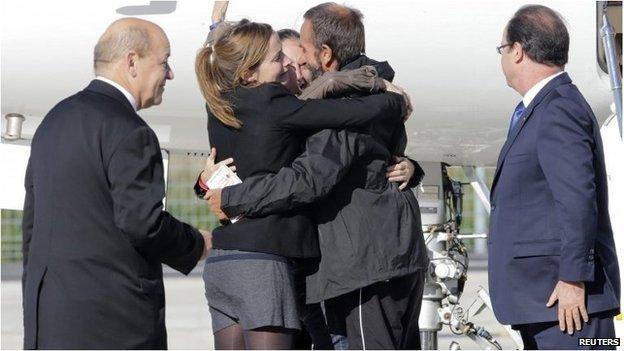UN urges end to ransom payments to terrorist groups
- Published

French hostages were released in October amid wide speculation a ransom was paid
The UN Security Council has approved a resolution urging countries to stop paying ransoms to terrorist groups.
The UK-drafted resolution is designed to put pressure on governments.
The British UN ambassador said al-Qaida-linked groups had made at least $105m (£63m; 77m euros) in ransoms for hostages in three-and-a-half years.
The resolution did not introduce new legal obligations as states are already required not to pay kidnap ransoms under an agreement adopted in 2001.
It was passed unanimously by the 15-member Security Council on Monday.
'Break the cycle'
"We estimate that in the last three and a half years, al-Qaeda-affiliated and other Islamist extremist groups have collected at least $105m," Britain's ambassador to the UN, Mark Lyall Grant, told reporters after the vote.
"It is therefore imperative that we take steps to ensure that kidnap for ransom is no longer perceived as a lucrative business model and that we eliminate it as a source of terrorist financing," he said. "We need to break that cycle."
UK officials believe the number of terrorists kidnappings in countries such as Syria, Yemen and Nigeria are going up - as well as the number of groups doing it.
Several governments are suspected of having paid ransoms to militant groups in recent years.
Four French men kidnapped in Niger three years ago were freed last October amid reports that a ransom of 20m euros (£17m, $26m) was paid to ensure their release. France's government denied paying the money.
Samantha Power, US ambassador to the UN, said hostage takers looking for ransoms "distinguish between those governments that pay ransoms and those that do not".
They "make a point" of not taking hostages from those countries that refuse to make concessions, she said.
The resolution said member nations should "prevent terrorists from benefiting directly or indirectly from ransom payments or from political concessions and to secure the safe release of hostages".
It also urges countries to encourage private businesses to follow guidelines on preventing and responding to kidnappings by extremist groups.
- Published13 December 2013
- Published21 January 2014
- Published30 October 2013